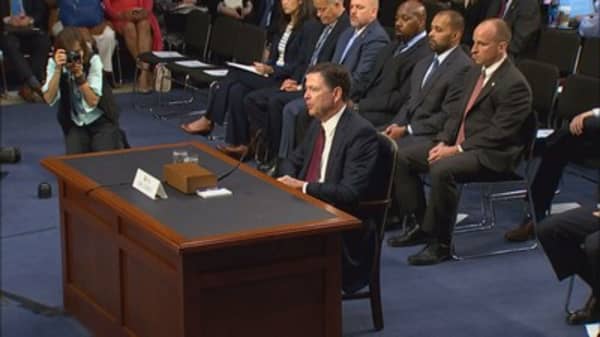Viewers across the country expected riveting television from today's Senate Intelligence Committee hearing, and the star witness, former FBI director James Comey, delivered. His testimony contained few actual surprises — most of it was previewed in his written remarks, which were themselves foreshadowed by news reports. But it still painted a lurid picture of a United States president pressuring the FBI director to declare his loyalty, and to prove it by dropping the FBI's investigation into the president's former aide.
What was surprising was not so much what Comey said, but how lawmakers responded. Members of both parties duly fretted over Russia's interference in the 2016 election. When it came to the Trump campaign's possible role in that interference, though, there was little discussion. And Trump's defenders on the committee did their best to downplay the president's attempt to interfere with the FBI's investigation. In a committee that is generally marked by rare bipartisanship, the partisan divide was on stark display.
The rule of law, however, should never be a partisan issue. Although senators questioned Comey closely on his response to Trump's inappropriate comments, they did not question his version of events. They seemed to accept that Trump made the statements Comey attributed to him —namely, that he hoped Comey would "let go" of the investigation into former National Security Adviser Michael Flynn. At that point, all partisanship should have receded, and the committee should have been unanimous in its condemnation. A president asking the FBI investigator to drop an investigation into the president's associate is a clear-cut case of obstruction of justice.
Some committee members tried to avoid this conclusion by suggesting that Trump was merely expressing an idle wish that the investigation would end, rather than asking Comey to end it. As defenses go, this one is laughable. The president began the meeting by asking Comey if he wanted to keep his job. In the same discussion, he said, "I hope you can see your way clear to letting this go, to letting Flynn go." There is nothing subtle in this juxtaposition. When the boss asks if you wants to keep your job and then tells you what he "hopes" you will do, you get the message. And when you fail to honor his "hopes" and get fired — well, that clears up any lingering ambiguity.



